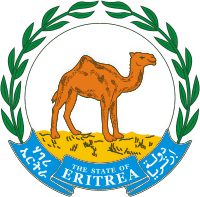August 29, 2012
Intervention by H.E. Mr. Osman Saleh Mohammed, Minister of Foreign Affairs of the State of Eritrea

At the Interactive Debate on
“Lasting Peace through Joint Global Governance”
Tehran, 28-29 August 2012
Your Excellency Ali Akbar Salehi,
Minister of Foreign Affairs of the Islamic Republic of Iran,
Excellencies and Dear Colleagues,
Ladies and Gentlemen,
Let me extend my heartfelt gratitude and appreciation to the people and government of the Islamic Republic of Iran for the warm reception and generous hospitality extended to my delegation since our arrival.
I wish to congratulate the Islamic Republic of Iran for its assumption of the chairmanship of the Non-Aligned Movement. On behalf of the Eritrean people and my government I extend condolences to the people and government of Islamic Republic of Iran on consequences of the tragic earthquake.
Let me also express my delegation’s deepest appreciation to the Government of the Arab Republic of Egypt, the outgoing Chairman of the Coordinating Bureau for its outstanding and able leadership in steering the work of our Movement for the last three years.
Mr. Chairman,
The theme of our gathering, “Lasting Peace through Joint Global Governance”, is indeed timely and encapsulates the greatest challenge of our time. At a time when our societies, more than ever, have come to realize how small our world is and how our destinies are
intrinsically intertwined, global problems, such as food insecurity, climate change, energy crisis, violence and conflicts, unemployment, human trafficking, organized crime and terrorism, to mention but few, continue to persist unabated.
The limitations of existing structures of global governance to effectively deal with the present and emerging challenges are more evident than ever. But, efforts to harness effective multilateral response of the daunting global challenges are faced with increasing
unilateralism and militarism of few big powers. In the past decades, these countries have often resorted to unilateral embargos, economic sabotages, and direct and indirect military interventions to destabilize countries and change national governments.
Regrettably, we are increasingly witnessing that international body such as the United Nations Security Council and the Human Rights Council being dragged into taking action on matters that have nothing to do with the maintenance of international security or
promotion of human rights. These have not only undermined the sacrosanct principles of international relations respect to sovereignty, territorial integrity and political independence of states; but also made the world a more dangerous place to live for many of our societies.
Developing countries, which constitute the membership of our Movement, are the most adversely affected by many of the global challenges; yet, due to the lack of equitable representation in global institutions our voices and perspectives are often underestimated and ignored. This was primarily due to the fact that the global south has so far failed to speak with one voice. We in the Non-Aligned Movement must rise beyond short-term differences, and collectively approach global challenges with one voice to reform the existing system. As NAM members, we need to be vigilant by ensuring that the United Nations and its institutions are not used in undermining the principles of international law that they were created to protect and promote.
We should ensure that the bodies of global governance are utilized to promote peace and dignity and ensure a better standard of living for the generations to come, and not to impose the will of the few big powers on others. To this end, our Movement must pursue a proactively strategy to render the global governance more efficient, adaptable, transparent and truly representative. We should collectively work to ensure the full participation of developing countries in decision-making and norm-setting; and make global structures more responsive to the
needs of the developing world.
Mr. Chairman,
The growing and deepening economic inequalities between the rich and the poor countries have for long led for the political marginalization of the South. The impact of the world financial and economic crisis, coupled with food and energy crises, continue to
enormously affect the efforts of developing countries to attain the Internationally Agreed Development Goals, including MDGs.
The discouraging results of the long awaited Rio+20 Conference last June, primarily due to the lack of commitment from the developed world has sent a clear message, “business as usual” is not a solution. Our collective conscience compels us to galvanize our efforts and resources in order to find immediate and innovative solutions anchored in the South-South cooperation and
integration. Close economic, cultural and technological exchange is not only a desire but a must if we are to meet the hopes and aspirations of our societies.
Mr. Chairman,
In conclusion, as many distinguished speakers mentioned the greatest source of global insecurity and inequality is the desire of some countries to dominate and exploit. We should combat this adventurism by enhancing and promoting multilateralism. We need to translate through action the noble goals of our Bandung, the preservation and promotion of peace and elimination of hunger and deprivation and the establishment of a just and stable world order. Eritrea is committed to play its role along with other sisterly countries in order to ensure the implementation of the decisions of this Summit.
Thank You!



